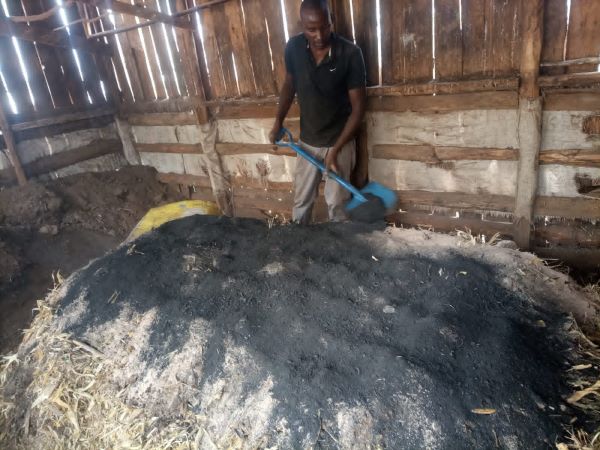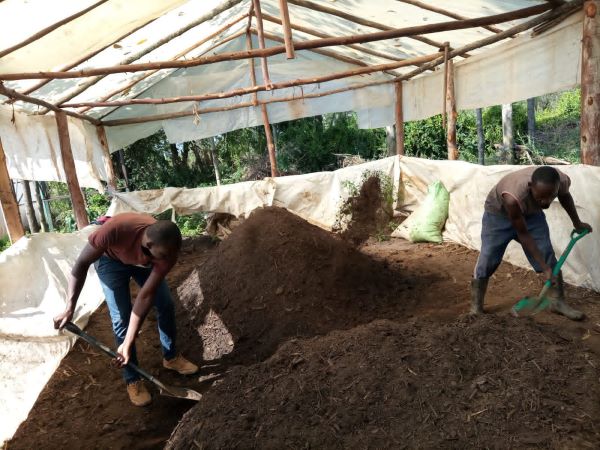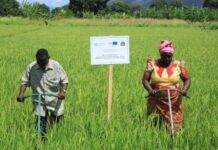By Zablon Oyugi
With over 50 million Kenyans to be fed daily, it becomes a matter of urgency for agricultural stakeholders across the country to find ways to increase agricultural productivity to meet the growing demand.
One option that farmers have relied on for long is the use of chemical or synthetic fertiliser which do not replenish the soils and in the long run making them unproductive and unprofitable for growers.
It is in the wake of this adverse land degradation that organic fertiliser appear like the panacea.
Robert Mwangi, an agri-entrepreneur from Kenya’s Nakuru County is now helping farmers within the area and beyond to boost their soil fertility and crop production by manufacturing affordable organic fertiliser using farm wastes.
The venture he started two years ago with a seed capital of Ksh160,000 part of his savings after working for two years for a local audit firm, is now changing his life and that of many farmers in the region.
“Growing up in a rural area where I watched my peasant parents struggle to produce enough food for the family due to unproductive soil has always set me thinking of an organic remedy that would help me to make an impact in agriculture sector,” said the 2014 Bachelor of Economics and Statistics graduate from the University of Nairobi.
After leaving his job in 2016 he started off with chicken farming after a training by a local chicken firm, some fish, dairy and beekeeping just to lay ground for the bigger venture.
After trying his hand on these various practices he would launch his long incubated organic fertiliser manufacturing dream after getting some starter pack of black soldier fly maggots through a connection with International Centre for Insect Physiology and Ecology (ICIPE).
Decomposition process

According to the 31 years old, black soldier flies (BSF) is an eco-friendly insect that naturally converts farm wastes into organic fertilizer in 15 days of decomposition process.
“To produce the fertilizer, first, a farmer has to be committed to go the whole route of domesticating the maggots and nurturing them in a special container until larvae stage for seven days”, explains Mwangi.
The black soldier fly larvae is then introduced into farm wastes such as chicken waste, pigs waste among others where they feed as they convert the waste into an organic fertilizer.
The end result from this breakdown is a decomposed heap which can be kept for a month before the frass is ready for use.
“The decomposition is done to make the fertilizer mature or ready for the soil because without it, the fertilizer could easily scorch plants,” said Mwangi adding that it is during the decomposition that microbes such as molasses are diluted with water and sprayed on the heap.
Other than his chicken farm, Mwangi collect wastes from other farmers, market places and slaughter houses hence helping in reducing the greenhouse gas emissions like methane gas which is produced when the waste is rotten and that has a negative effect towards climate change.
Better results
Before commercialisation, Mwangi had to run a number of demonstrations in various farms of some potato farmers in Lari, Njoro and Nyanadarua and the results were impressive.
“The farmers registered up to 80% increase in their production something that has caused increasing demand due to the fertiliser’s healing aspect to the soil and friendly to plants even in dry areas or conditions,” said Mwangi.
Tea and coffee farmers who need a nitrogen loaded fertilizer, he says, “I recommend a tailor-made type where I add to the decomposing manure water full of fish wastes from ponds to realise the important micro element besides boron and calcium which are equally produced.”
Branding and pricing
To help him market the growing venture, Mwangi has since begun packing the fertiliser into 50 and 25kg sacks branded Campo Ltd, the name for his enterprise.
The 50kg bag goes at Ksh1,800 on wholesale and Ksh2,300 on retail while the 25kg bags sells at Khs900 on wholesale and Ksh1,000 retail.
“For the two years the enterprise has operated, it has served over fifty recurrent customers, most of whom are referrals translating to Ksh288,000 especially in peak season.”
Challenges
At the beginning Mwangi says he had difficulties in managing his cash flows but things have eased up and he can now predict the direction of his enterprise thanks to business mentorship programme by Kuza Biashara, a local firm training small business owners on business skills.
“The only remaining challenge is how I can cut the cost of production because I still rely on hired chaff cutter machine at Ksh1,000 per hour, a tuk tuk for transport, and a weighing scale limiting my production capacity to 300 50kg bags in a month from my target of 800 of such bags.”
Mentoring other youths
As a result of his good progress, many youths from the area are now joining Mwangi to learn the venture.
“The registration of the organic fertiliser enterprise is underway with Kenya Organic Agriculture Network (KOAN) and I wish to turn it into a resource centre of information for farmers and training place for fellow youth.”










[…] Credit: Source link […]
Comments are closed.